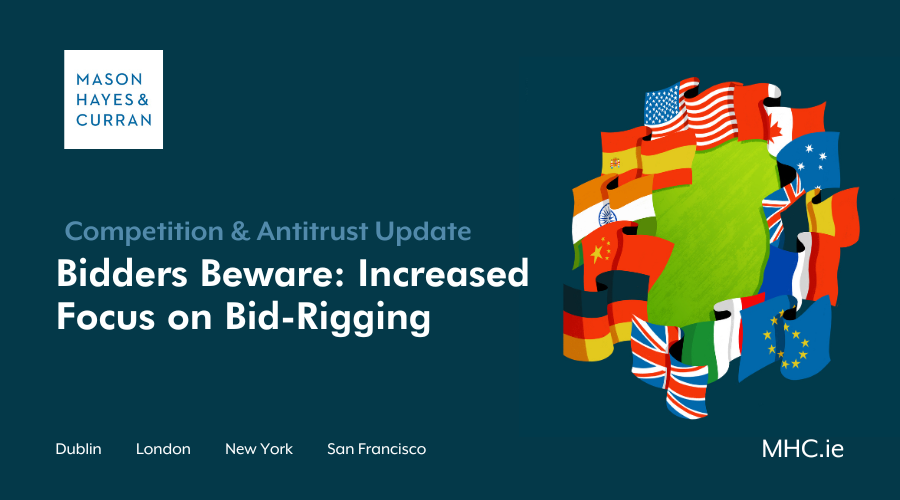
Ireland’s Competition (Amendment) Act 2022 (2022 Amendment Act) was signed into law on 29 June 2022 and came into force on 27 September 2023. It introduces, amongst other provisions, a new specific offence of ‘bid-rigging’ as well as significant new enforcement powers for the Competition and Consumer Protection Commission (CCPC) and the Commission for Communications Regulation (ComReg).
These new provisions indicate that bid-rigging will be an area of increased focus for the CCPC going forward.
It is expected that new procurement data tracking measures will also be introduced to enable anomalies in procurement processes to be identified.
What is bid-rigging?
Bid-rigging is a form of cartel behaviour where bidders or potential bidders in a procurement process collude to ensure that a particular bidder wins, enabling them to extract a higher price for the work.
Bid-rigging can come in various forms, including:
- Bid rotation - bidders taking turns to win contracts
- Bid suppression - certain bidders not bidding or withdrawing their bids so that a particular bidder can win
- Complementary bidding - certain bidders may submit artificially high bids so as to ensure that a particular bidder wins
While bid-rigging is difficult to detect, certain patterns, pricing irregularities or other signs of suspicious behaviour can, in some cases, provide an indication of collusion.
Treatment in Ireland to date
To date, bid-rigging has been treated as a form of price fixing or market sharing, both of which are prohibited by Sections 4(1)(a) and 4(1)(c) of the Competition Act 2002.
This approach has resulted in difficulties in prosecuting the offence and there has been only one bid-rigging prosecution to date in Ireland, in the matter of Aston Carpets.
What changes does the Amendment Act bring?
The 2022 Amendment Act, which transposes Directive 2019/1, is designed to address these difficulties by creating a specific new criminal offence of “bid-rigging”, and as a result confirms that this kind of concerted behaviour is unlawful. The 2022 Amendment Act identifies several bid-rigging practices, namely:
- An agreement not to submit a bid or to withdraw a bid - this would cover bid suppression or bid rotation
- An agreement to submit a bid on terms agreed with another bidder - this would cover complementary bidding
- Collusive tendering
The 2022 Amendment Act also seeks to ensure that the CCPC will have sufficient enforcement powers to combat bid-rigging effectively. These include amendments to the Criminal Justice (Surveillance) Act 2009, which will give the CCPC the ability to monitor and record persons suspected of being involved in a hardcore cartel offence. These include intercepting and recording electronic communications and covert video and audio surveillance of suspects. Exercise of these powers will, however, be subject to High Court authorisation and must meet the necessity test.
In addition to these new surveillance powers, the CCPC had also sought new powers under the 2022 Amendment Act which would have enabled it to access bid data on eTenders, the digital platform operated by the Office of Public Procurement, for the purposes of identifying signs of bid-rigging. It was decided that this should be provided for under separate procurement legislation and, once that legislation is enacted, it will further increase the CCPC’s ability to combat bid-rigging in Ireland.
Conclusion
The creation of a specific cartel offence of bid-rigging signals that this will be an area of increased focus for the CCPC. In advocating for the new legislation, the CCPC had pointed to estimates from the OECD and other countries which suggest that the rate of overcharge as a result of bid-rigging is between 20% and 30%. The Irish State procures goods, services and works worth approximately €18.5 billion each year. If even 1% of this was subject to bid-rigging, greater scrutiny and enforcement of bid-rigging could result in significant savings for Irish taxpayers.
It is also expected that new procurement data tracking measures will be introduced to enable anomalies in procurement processes to be identified. During debates in the Oireachtas (Irish Parliament), the CCPC referenced its ambition to upscale its enforcement activity in the area of bid-rigging. It specifically referred to Germany, which has a separate offence in bid-rigging and where the German Competition Authority has a separate unit entirely dedicated to combatting bid-rigging.
This is in line with the Irish Government’s commitment to invest in technology to investigate crime as part of its implementation plan to combat economic crime.
It remains to be seen what concrete impact this will have on the number of prosecutions for bid-rigging in Ireland.
For more information on the Competition (Amendment) Act 2022, please contact a member of our Competition & Antitrust team.
The content of this article is provided for information purposes only and does not constitute legal or other advice.







